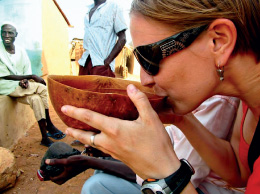Profile: Search for Clean Water in Africa
 Some women in rural Ghana and Ethiopia each morning walk one or two miles to a river or a well pump. They join the line waiting to fill clay amphorae or 20-liter yellow plastic jugs with water that they hope is potable. They walk home to feed the family and work in the fields. In late afternoon, they repeat the trek.
Some women in rural Ghana and Ethiopia each morning walk one or two miles to a river or a well pump. They join the line waiting to fill clay amphorae or 20-liter yellow plastic jugs with water that they hope is potable. They walk home to feed the family and work in the fields. In late afternoon, they repeat the trek.
Individuals, governing bodies, and NGOs are working to improve access to clean water, but first, they must comprehend the social, political, and gender dynamics that play into the status quo. Stephanie Stawicki ’04 recently researched these issues while earning her master’s in international development from Emory.
“My work focused primarily on water governance in Ethiopia, related to Millenium Water Project and CARE International, and in Ghana, related to the International Water Management Institute,” says Stawicki, associate director of Lifelong Learning at The Wharton School, University of Pennsylvania, and a trustee of GambiaRising, a nonprofit that funds education in Gambia.
In Ethiopia, Stawicki gathered data on water governance in villages where CARE had constructed water-delivery devices.
In Ghana’s Upper East region, an underdeveloped agricultural area, she interviewed women to dissect their crucial role. “We were trying to see how women’s everyday activities were organized around water, what the significance of water is in relation to their work and social networks,” Stawicki says. One meeting with a Queen Mother, the most important woman in a village, turned into a social event that attracted 50 local women, all of whom wanted to share their challenges.

Stawicki and her colleague, Kalie Lasiter, synthesized the women’s contributions, as well as interviews with chiefs and various government agency officials, to write a qualitative analysis on gender and water resources management policies for the Upper East region. The work was part of a challenge program on water and food conducted by an NGO, Consultative Group on International Agricultural Research.
Stawicki, an international affairs graduate, says her goal was to identify strategies going forward that link gender inclusiveness with development outcomes. “Water is integral to everything in our lives. If you don’t have access to water, then everything you do is affected.”
—Sharon Sanders